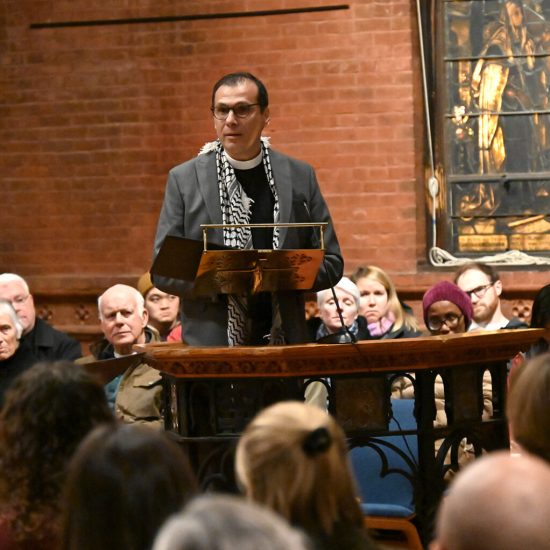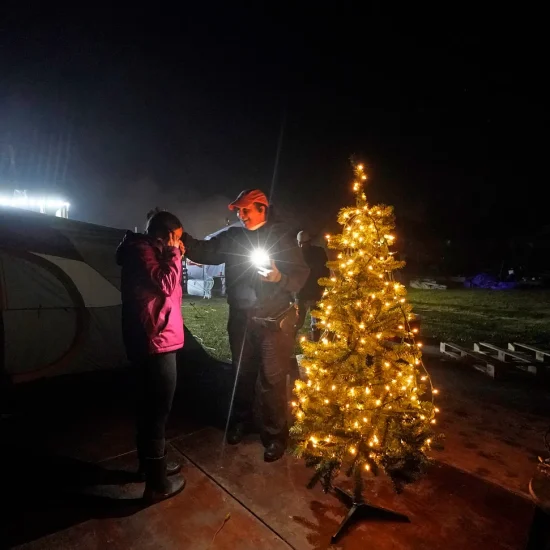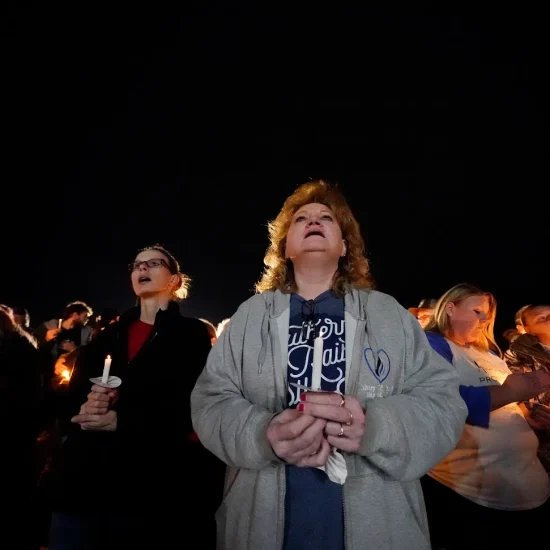
When I was a girl I had a brown and white Fisher-Price record player on which I would play the 45s that came with my Disney storybooks. My favorite vinyl by far was There’s a Hippo in My Tub, an Anne Murray collection of lullabies. The hours of my childhood spent resetting that needle into exactly the right groove are the reason I sang “You Are My Sunshine” to my babies while they were in my womb and why ten years later, I still sing it over their heads at bedtime. One of my favorite songs on that album is about stars, angels, and heaven.
In it, one child asks another why on that night, when they’re looking up at the heavens, the stars are so bright when “there wasn’t a star last night.” The other child answers with a story that “stars are the windows to heaven where angels peep through.”
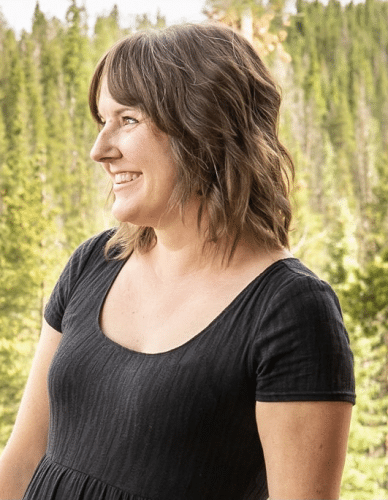
Lauren Graeber
Though I had been hearing stories about angels since I was in my mother’s womb, I didn’t really believe in them. Even as we covered our Christmas tree in angel ornaments and even as my church choirs sang out the “Glorias” that apparently filled the shepherd’s night sky, no one I knew said they were real. No one explained what they were or why their activity was contained to days long gone. Everyone seemed to accept their presence, even if they didn’t take them seriously.
But I had that beautiful lullaby I would sing to myself about stars that were actually shuttered openings to heaven and angels that paid enough attention to children to smile when they were good and cry when they were naughty. I didn’t believe those angels were real and that didn’t stop me from wanting them to be.
Several years ago I spent the Advent season trying very hard to help my children make sense of the most famous angel story in the Bible, the Christmas one. Each Sunday we gathered together as a family and I pulled figurines from all our nativities to tell the story of Jesus’s birth. I called it More Honest Advent, so I stuck with what the scriptures actually say (e.g. no donkeys allowed and the wise men didn’t show up until January).
My daughter was seven at the time and she seemed mostly engaged that first week as we told the story of the angels that came to Mary and Elizabeth. I had taken two Mary figurines, borrowed a Joseph to be Zachariah, and had the Bible open on the table. My husband did a wonderful job reading the angelic words as he danced our wooden peg angel across the coffee table bearing good news about boys not yet born.
Both my daughter and her little brother politely listened the next week when another angel appeared, this time to Joseph, and when those nervous parents had to go to Bethlehem and stay alongside animals. But the kids lost all interest in anything I had to say once we let them grab all the animals they could find in our nativities to crowd around the manger.
In the third week of Advent, when once again angels appear, this time in the heavens to sing out their “Hosannas” for the shepherds, our daughter looked at me holding the Bible and said, “I don’t believe angels are real.”
We asked her questions and told her we weren’t upset with her even as we exchanged panicked looks over her head. I asked her to be open to the idea that just because you’ve never seen something, it doesn’t mean it’s not real. But she set her jaw and held her neck so still and told us that she didn’t believe. As I returned the heavenly host I had collected for that night’s story into their places on our shelves, I wept for my daughter who didn’t believe in something I also didn’t really believe in.
My seven-year-old’s leap from questioning angels to the very existence of God felt suddenly imminent. What did it mean that I didn’t have a good answer for her about how to let faith guide your life without demanding it swallow up your big questions?
Wise friends reminded me that my child’s declaration of unbelief was developmentally appropriate. They echoed back to me my own words about how a lot of stuff with kids is a phase, which isn’t to say it doesn’t matter, only that parenting requires constant revision. Sometimes that feels like a curse. On this point, it was an invitation to receive her ideas about angels and to patiently see where her next questions led her.
A quick review of angels in scripture suggests it’s probably a bit blithe to hope angels are real and that they might come visit you. Even when they bear good news, it’s never uncomplicated. An angel came to the mother of Samson who had been barren long enough to break her heart and told her about the boy she miraculously carried, the one who would be a Nazirite, the one she would need to carefully bear and raise into a man. She follows that angel’s instructions to a T, and she has a boy who becomes a monster of a man. He rips apart a lion, sets fire to foxes. He sets traps in which others are hurt, kills wantonly, and his wives all come to ruin. That’s not really a sweet angel story.
Even if I flip to the beginning of Luke, to the story I was telling at Advent, the presence of the angels doesn’t ultimately bring good news for the characters. Elizabeth, who was barren like Samson’s mother, unexpectedly becomes pregnant after an angel appears to her husband. Their son John is a prophet, a pious and good man. He’ll wear funny clothes, eat strange foods, and live in the desert calling people to a different way of life. Until, of course, someone wants him dead.
Then there’s that angel that came to Mary, the one that set her singing a lullaby as old as her people. Mary sings about a God who makes the wrongs of the world right, a beautiful song about justice and mercy. Words I can almost see coming true for Mary’s boy, but I have to squint through his execution to find them. I wonder if Mary didn’t rest her hand on her growing belly as she hummed those words just as I rested my hand on my children and sang to them about stars that are windows to heaven. We were mothers singing to our babies about the world we hoped would receive them. If I’m honest, I sometimes sing to ward off the angels – those bearers of news that preludes tragedy – from touching my children’s lives.
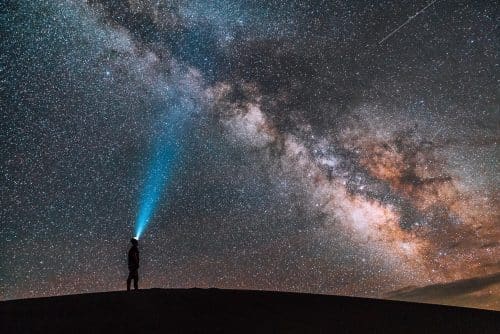
Josh Gordon / Unsplash
But all that changes when we’re camping in dark-sky spots and the Milky Way is stretching out over me. I can look up at the stars and see them open into something that is more than this world. I can see that there is more to this world than merely all its wrongs. I point up at it and call it God for my children.
When I was a child I got to the other side of heaven not because I believed angels were real, but I could listen to a lullaby and hold hope to the tune of a steel guitar. I still hear hope on the edges of some weird angel stories in the Bible, momentary flashes when a woman and her child are the absolute center of God’s attention.
In her book Braiding Sweetgrass, indigenous scholar and teacher Robin Wall Kimmerer reflects on the intersection of her beliefs with those of her evangelical Christian students. She writes, “I came to know that it wasn’t naming the source of wonder that mattered, it was wonder itself.” While I often find myself short on answers for my children, we have yet to run out of opportunities to wonder.
At the end of the Anne Murray song, the child who has been explaining the inner workings of the cosmos to the other changes their final line: “My mom says stars are the windows to heaven where angels peep through.” Participating in what I hope is another More Honest Advent two years later, I will again pull out the nativities and tell my children the angel stories and invite them to wonder with me about what those luminous characters might mean.
We’ll talk about listening generously when folks open their hearts and tell us angels appeared. We’ll revise our ideas, lean into our phases, and receive the mysteries of the universe and the miracles in our lives. We’ll talk about how you don’t have to believe everything is real in order to hold onto hope.
Lauren Graeber is a writer, teacher of writing workshops, and Co-Director of the Center for Prayer and Spirituality at St. Mary’s Episcopal Church in High Point, North Carolina. She navigates faith, parenting, and questions that delightfully refuse to be answered on IG @definitelysometimes.

